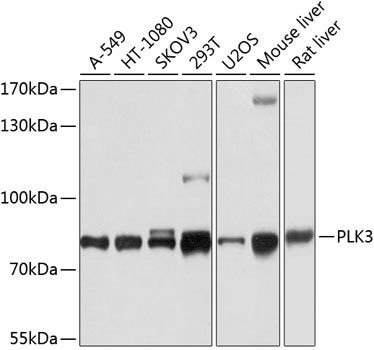Anti-PLK3 Antibody (CAB8674)
- SKU:
- CAB8674
- Product type:
- Antibody
- Application:
- WB
- Reactivity:
- Human
- Mouse
- Rat
- Host Species:
- Rabbit
- Isotype:
- IgG
- Research Area:
- Cell Death
Description
| Antibody Name: | Anti-PLK3 Antibody |
| Antibody SKU: | CAB8674 |
| Antibody Size: | 20uL, 50uL, 100uL |
| Application: | WB |
| Reactivity: | Human, Mouse, Rat |
| Host Species: | Rabbit |
| Immunogen: | Recombinant fusion protein containing a sequence corresponding to amino acids 487-646 of human PLK3 (NP_004064.2). |
| Application: | WB |
| Recommended Dilution: | WB 1:500 - 1:2000 |
| Reactivity: | Human, Mouse, Rat |
| Positive Samples: | A-549, HT-1080, SKOV3, 293T, U2OS, Mouse liver, Rat liver |
| Immunogen: | Recombinant fusion protein containing a sequence corresponding to amino acids 487-646 of human PLK3 (NP_004064.2). |
| Purification Method: | Affinity purification |
| Storage Buffer: | Store at -20°C. Avoid freeze / thaw cycles. Buffer: PBS with 0.02% sodium azide, 50% glycerol, pH7.3. |
| Isotype: | IgG |
| Sequence: | VLFN DGTH MALS ANRK TVHY NPTS TKHF SFSV GAVP RALQ PQLG ILRY FASY MEQH LMKG GDLP SVEE VEVP APPL LLQW VKTD QALL MLFS DGTV QVNF YGDH TKLI LSGW EPLL VTFV ARNR SACT YLAS HLRQ LGCS PDLR QRLR YALR LLRD RSPA |
| Gene ID: | 1263 |
| Uniprot: | Q9H4B4 |
| Cellular Location: | Cytoplasm, Golgi apparatus, Nucleus, centrosome, cytoskeleton, microtubule organizing center, nucleolus |
| Calculated MW: | 71kDa |
| Observed MW: | 82kDa |
| Synonyms: | PLK3, CNK, FNK, PLK-3, PRK |
| Background: | The protein encoded by this gene is a member of the highly conserved polo-like kinase family of serine/threonine kinases. Members of this family are characterized by an amino-terminal kinase domain and a carboxy-terminal bipartite polo box domain that functions as a substrate-binding motif and a cellular localization signal. Polo-like kinases are important regulators of cell cycle progression. This gene has also been implicated in stress responses and double-strand break repair. In human cell lines, this protein is reported to associate with centrosomes in a microtubule-dependent manner, and during mitosis, the protein becomes localized to the mitotic apparatus. Expression of a kinase-defective mutant results in abnormal cell morphology caused by changes in microtubule dynamics and mitotic arrest followed by apoptosis. |
| UniProt Protein Function: | PLK3: a kinase of the PLK family. Phosphorylated and activated following DNA damage or mitotic spindle disruption. Interacts with Chk2 and the interaction is enhanced upon DNA damage. Apparent substrates include Chk2 and p53. Plays an important role in regulating microtubule dynamics and centrosomal function. Deregulated expression of Plk3 results in cell cycle arrest and apoptosis. |
| UniProt Protein Details: | Protein type:Kinase, protein; Nucleolus; EC 2.7.11.21; Protein kinase, Other; Protein kinase, Ser/Thr (non-receptor); Other group; PLK family Chromosomal Location of Human Ortholog: 1p34.1 Cellular Component: centrosome; cytoplasm; Golgi stack; nucleolus; nucleoplasm; nucleus Molecular Function:p53 binding; protein binding; protein serine/threonine kinase activity Biological Process: apoptosis; cytoplasmic microtubule organization and biogenesis; DNA damage response, signal transduction by p53 class mediator resulting in cell cycle arrest; endomitotic cell cycle; G1/S transition of mitotic cell cycle; G2/M transition of mitotic cell cycle; mitotic cell cycle checkpoint; negative regulation of apoptosis; negative regulation of transcription from RNA polymerase II promoter; protein kinase B signaling cascade; regulation of cell division; regulation of cytokinesis; response to DNA damage stimulus; response to osmotic stress; response to radiation; response to reactive oxygen species |
| NCBI Summary: | The protein encoded by this gene is a member of the highly conserved polo-like kinase family of serine/threonine kinases. Members of this family are characterized by an amino-terminal kinase domain and a carboxy-terminal bipartite polo box domain that functions as a substrate-binding motif and a cellular localization signal. Polo-like kinases are important regulators of cell cycle progression. This gene has also been implicated in stress responses and double-strand break repair. In human cell lines, this protein is reported to associate with centrosomes in a microtubule-dependent manner, and during mitosis, the protein becomes localized to the mitotic apparatus. Expression of a kinase-defective mutant results in abnormal cell morphology caused by changes in microtubule dynamics and mitotic arrest followed by apoptosis. [provided by RefSeq, Sep 2015] |
| UniProt Code: | Q9H4B4 |
| NCBI GenInfo Identifier: | 51338822 |
| NCBI Gene ID: | 1263 |
| NCBI Accession: | Q9H4B4.2 |
| UniProt Secondary Accession: | Q9H4B4,Q15767, Q5JR99, Q96CV1, |
| UniProt Related Accession: | Q9H4B4 |
| Molecular Weight: | 71,629 Da |
| NCBI Full Name: | Serine/threonine-protein kinase PLK3 |
| NCBI Synonym Full Names: | polo like kinase 3 |
| NCBI Official Symbol: | PLK3 |
| NCBI Official Synonym Symbols: | CNK; FNK; PRK; PLK-3 |
| NCBI Protein Information: | serine/threonine-protein kinase PLK3 |
| UniProt Protein Name: | Serine/threonine-protein kinase PLK3 |
| UniProt Synonym Protein Names: | Cytokine-inducible serine/threonine-protein kinase; FGF-inducible kinase; Polo-like kinase 3; PLK-3; Proliferation-related kinase |
| Protein Family: | Serine/threonine-protein kinase |
| UniProt Gene Name: | PLK3 |
| UniProt Entry Name: | PLK3_HUMAN |



